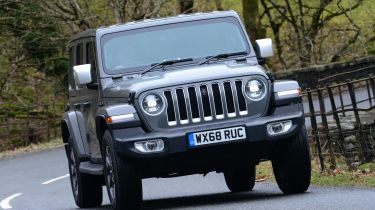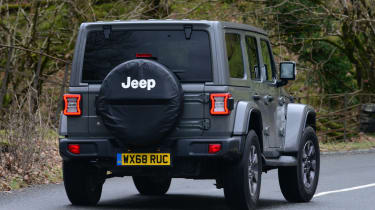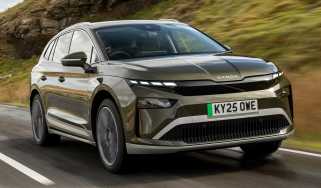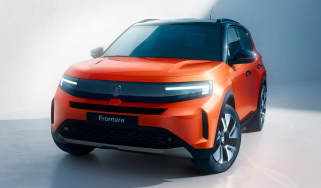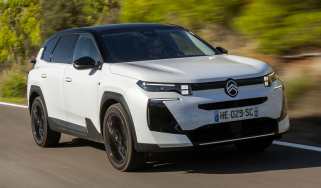New Jeep Wrangler 2019 review
In the absence of the Land Rover Defender, can the Jeep Wrangler take its place as king of the no-nonsense 4X4?

Still as rugged and capable off-road as it ever was but with a more civilised interior and more all-round appeal generally, the new Wrangler represents a well-judged step forwards for the famous Jeep. As such it’s hard to think of anything this side of a Mercedes G-Wagen that offers a similar spectrum of ability, and that car costs twice as much as the £48k Wrangler.
They say the new Jeep Wrangler can “Go anywhere” and “Do anything”. If the latter half of this marketing mantra sounds like hyperbole – because let’s be honest about this, it is – then the “Go Anywhere” claim is a fair bit more credible. The Wrangler’s off-road capability has always been eye-watering and it has become more impressive than ever in this instance, while elsewhere the entire vehicle has simply got better, become more desirable, and is a more complete 4x4 as a result.
Not only has the Wrangler’s styling had a sympathetic redesign all round but there are two new engines, one a 2.0-litre petrol with 268bhp and 400Nm, the other a 2.2-litre turbo-diesel with 197bhp/450Nm. The interior has also been comprehensively reworked to make it more appealing to a broader audience, reckons Jeep. As such, the new Wrangler isn’t just for people who want to drive out into the wilds and do some serious off-roading. With its new cabin, complete with 8.4in touchscreen infotainment system that includes Apple CarPlay and Android Auto, Jeep is confident that the latest Wrangler can easily be used as an everyday automobile. And so long as you’re not expecting S-Class levels of ride refinement and comfort, in this case it’s not far from the truth.
Used - available now

2023 Jeep
Wrangler
34,544 milesAutomaticPetrol2.0L
Cash £37,795
2023 Jeep
Wrangler
9,300 milesAutomaticPetrol2.0L
Cash £57,000
2020 Jeep
Wrangler
27,226 milesAutomaticPetrol2.0L
Cash £33,995
2016 Jeep
Wrangler
37,450 milesAutomaticPetrol3.6L
Cash £29,750Also new on this Wrangler are LED lights all round, and at the back there’s a reversing camera integrated neatly with the tailgate-mounted, full-size spare wheel. You even get blind spot monitoring and electronic roll control in the new 21st-century Wrangler, so although it’s still a thoroughly rugged and capable off-road machine at heart, there is definitely more to its vocabulary this time around.
There are three trim levels and two body styles to choose from; Overland, Sahara and Rubicon, all of which come with either two doors or four. Overland and Sahara are more on-road based in terms of their specification and styling while the Rubicon, with its black wheel-arches, black roof panels and standard fit 17in wheels and knobbly tyres, is the more serious off-road version. The Overland and Sahara both come on 18in wheels and tyres and are colour coded all over in a range of 10 different paint options that include Mojito Green, Firecracker Red and Sting Gray.
It’s hard to know what to compare the Wrangler with directly, now that the Land Rover Defender is no more (for the time being). Mercedes’ new G-Wagen is perhaps its most obvious competitor in dynamic terms, but that costs twice as much as the Wrangler, which starts at £44,865 for the two-door petrol or diesel, rising to £48,635 for the four-door version of either the Rubicon or Overland. The slightly less well-equipped four-door Sahara costs £46,365.
Either way, the new Wrangler represents a fair chunk of metal for the money, in any of its various specifications, especially now that Jeep has refined and improved the four-wheel-drive system, making it far easier to slip between the drive modes. These include two wheel-drive, high range, the setting you use when on-road; four wheel-drive auto; four wheel-drive part time and – for serious mud plugging – four wheel-drive low range. You still need to pull on a second gear lever to switch between these various modes, but in a way such antiquation rather suits the nature of the Wrangler, even if most of us would rather select drive modes via a button.
There’s no doubting the Wrangler’s off-road ability; truth is it can do stuff and go places that most owners wouldn’t even contemplate, let alone attempt. But it’s the new car’s on-road refinement that actually proves most surprising of all. We drove the 2.2-litre diesel four-door, all 2,044kg of it, and found it to be remarkably competent on the roads around the Lake District, decently civilised and, overall, just a much better driving experience than we expected.
True, the engine isn’t the smoothest or quietest if you rev it beyond 3,000rpm, but with 450Nm at 2000rpm and enough muscle to haul it to 62mph in a claimed 9.6sec, you don’t need to rev it hard to unleash the performance, all of which is metered out with impressive precision via the 8-speed auto gearbox.
The steering is also reasonably precise, the brakes cleaner and sharper in their response than we expected, while even the ride is much improved over the previous model. All in all, this is a much better Jeep Wrangler, one that offers more all-round appeal and more off-road ability than ever before.

